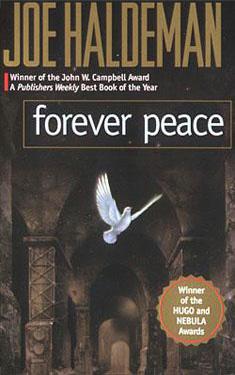Joe Haldeman
Read 2012, reviewed 5/19/2013
3 stars
This book felt like two separate novels. The first half is about the main character,
Julian Class, and his role in the war as a mechanic for a weapon called the
soldierboy. The soldierboy is operated
by a soldier connected through a mental link with the weapon. It’s a great technological concept. However, I was bored with the battle scenes. I realize the point of the battle scenes is
to give you an understanding of the theory of how the soldier becomes
telepathically linked to the soldierboy and its effects on the soldier. However, it quickly bored me.
Fortunately, the second half of the novel takes a very
different turn. Julian discovers that
the same process used to link a soldier with a soldierboy, if carried further,
turns humans in to peace-loving, non-violent beings. And the government and crazed radical cults
don’t like that. I read through this
part voraciously, loving the tension, and the race to find a way to make a permanently
peaceful Earth.
Another aspect I didn’t care for in this novel was the
story-telling technique. It bounced
between first person Julian, and third person observer. It was quite distracting, and probably added
to my dislike of the first half of the book.
It seemed more natural in the second half, but that may be because it
took me reading through all the war scenes to get the narrative style down.
Once again, Haldeman has created a novel which demonstrates
the futility of war. Here he takes it
one step further and parodies our current social conflict: War may be hell, but the infrastructure won’t
find a way to end it permanently, and there will always be crazy people who will
always support violence and war as a means to their end.
I only gave this book 3 stars because of my problems with
the narration, and my boredom with the first half. I do have concerns that I read this book
after reading “The Forever War” and was tainted because of it. If I had read this book first, I might have
liked it better. But I do realize that
in general I do not like reading war stories.
What saved this book was the second half.

No comments:
Post a Comment